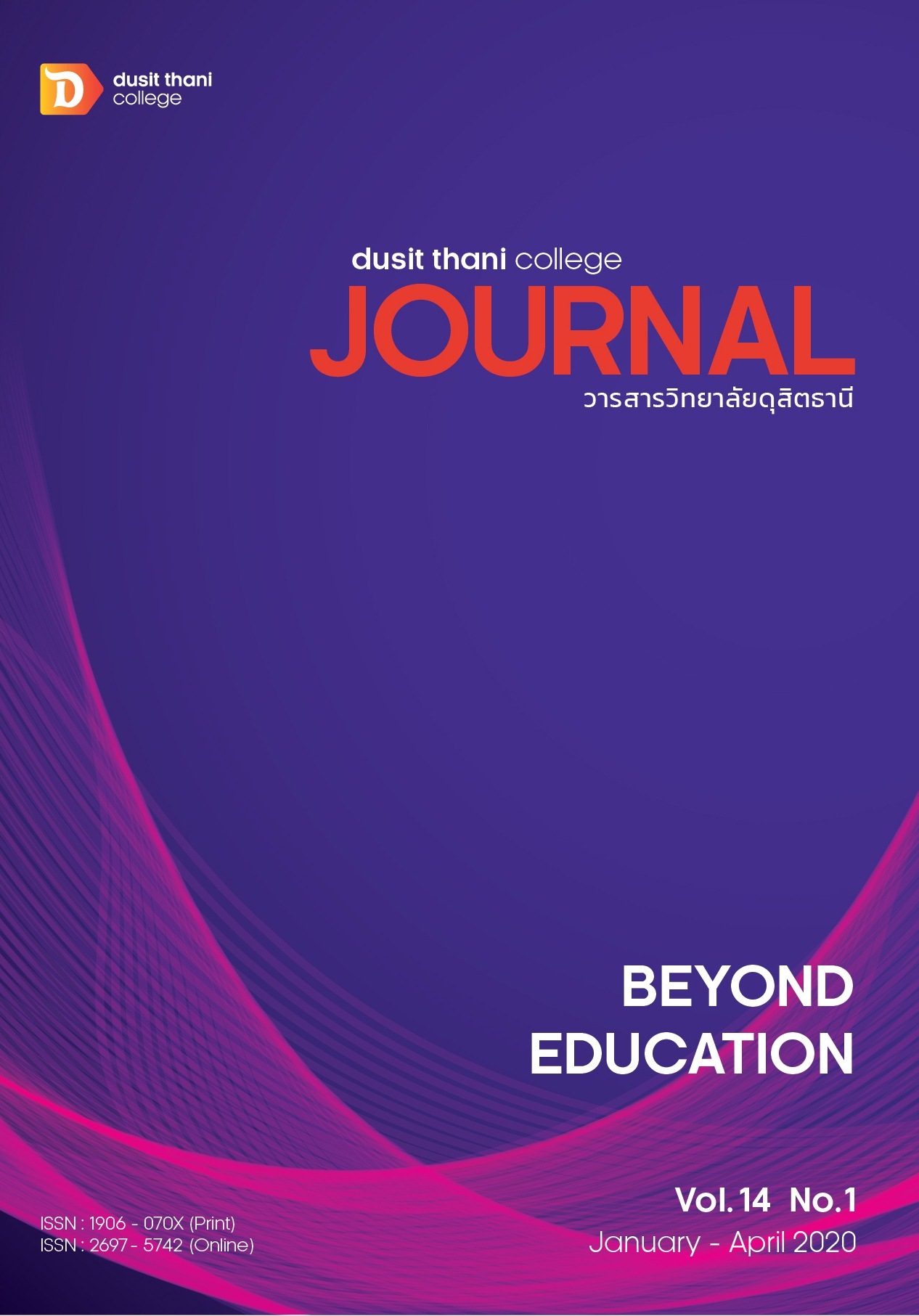ปัจจัยเชิงเหตุแบบบูรณาการทางจิตสังคมที่เกี่ยวข้องกับการคิดอย่างมีวิจารณญาณของนักศึกษาปริญญาโท
Main Article Content
บทคัดย่อ
การวิจัยนี้เป็นการศึกษาความสัมพันธ์เปรียบเทียบ ซึ่งมีกรอบแนวคิดพื้นฐานจากทฤษฏีปฏิสัมพันธ์นิยม มีวัตถุประสงค์เพื่อศึกษาตัวทำนายที่สำคัญและกลุ่มเสี่ยงที่เกี่ยวข้องกับการคิดอย่างมีวิจารณญาณของนักศึกษาระดับปริญญาโท กลุ่มตัวอย่างในการวิจัยคือ นักศึกษาระดับปริญญาโทชั้นปีที่ 2 จำนวน 451 คน สุ่มตัวอย่างโดยใช้วิธีการสุ่มแบบหลายขั้นตอน เครื่องมือที่ใช้ในการวิจัยเป็นแบบวัดประเภทมาตรประเมินรวมค่า จำนวน 11 แบบวัด มีค่าความเชื่อมั่นแบบสัมประสิทธิ์แอลฟ่าระหว่าง .61 ถึง .85 ผลการวิเคราะห์ถดถอยแบบพหุคูณปรากฏว่า ปัจจัยด้านจิตลักษณะเดิม สถานการณ์ และจิตลักษณะตามสถานการณ์ รวม 10 ตัวแปร สามารถทำนายการคิดอย่างมีวิจารณญาณได้ 42.8% ในกลุ่มรวม โดยมีลำดับตัวทำนายที่สำคัญคือ ทัศนคติต่อการมีเอกลักษณ์ทางวิชาการ ลักษณะมุ่งอนาคตควบคุมตน การประเมินแก่นแห่งตน นิสัยเดิมทางวิชาการ และการกำกับตนทางวิชาการ และพบกลุ่มเสี่ยงที่สำคัญคือ กลุ่มนักศึกษาปริญญาโทภาคพิเศษ ผลการวิจัยนี้ได้เสนอแนะแนวทางในการพัฒนานักศึกษาที่เป็นกลุ่มเสี่ยง และเป็นพื้นฐานเพื่อต่อยอดการวิจัย
Article Details
นโยบายการพิจารณากลั่นกรองบทความ
- บทความวิจัยและบทความวิชาการทุกเรื่องที่จะได้รับการตีพิมพ์ต้องผ่านการพิจารณากลั่นกรองโดยผู้ทรงคุณวุฒิ (Peer Review) ในสาขาที่เกี่ยวข้อง จำนวน 3 ท่าน/บทความ
- บทความ ข้อความ ภาพประกอบและตารางประกอบที่ลงตีพิมพ์ในวารสารเป็นความคิดเห็นส่วนตัวของผู้เขียน กองบรรณาธิการไม่จำเป็นต้องเห็นด้วยเสมอไป และไม่มีส่วนรับผิดชอบใด ๆ ถือเป็นความรับผิดชอบของผู้เขียนแต่เพียงผู้เดียว
- บทความที่จะได้รับการตีพิมพ์จะต้องไม่เคยตีพิมพ์ เผยแพร่ที่ใดมาก่อน และไม่อยู่ระหว่างการพิจารณาของวารสารฉบับอื่น หากตรวจสอบพบว่ามีการตีพิมพ์ซ้ำซ้อน ถือเป็นความรับผิดชอบของผู้เขียนแต่เพียงผู้เดียว
- บทความใดที่ผู้อ่านเห็นว่าได้มีการลอกเลียนหรือแอบอ้างโดยปราศจากการอ้างอิง หรือทำให้เข้าใจผิดว่าเป็นผลงานของผู้เขียน กรุณาแจ้งให้กองบรรณาธิการวารสารทราบจะเป็นพระคุณยิ่ง
เอกสารอ้างอิง
2. Ajzen, Icek. (1991). The Theory of Planned Behavior. Organizational Behavior and Human Decision Processes. 50 (December): 179 - 211.
3. Bhanthumnavin, Duchduen. (2000). Importance of Supervisory Social Support and Its Implications for HRD in Thailand. Psychology and Developing Societies. 12 (September): 155 - 166.
4. Dinh, Supasamut. (2015). Integration of Psychological and Situtaional Antecefents of Work Behavior in Cabin Crew. National Institute of Development Administration, Bangkok, Thailand.
5. Judge, Timothy A.; Locke, Edwin A. and Durham, Cathy C. (1997). The Dispositional Causes of Job Satisfaction: A Core Evaluations Approach. Research in Organizational Behavior. 19 (January): 151 - 188.
6. Judge, Timothy A. (2009). Core Self-Evaluations and Work Success. Psychological Science. 18 (Febuary): 58 - 62
7. Judge, Timothy A.; Erez, Amir.; Bono, Joyce E. and Thoresen Carl J. (2003). The Core Self Evaluations Scale: Development of a Measure. Personnel Psychology. 56 (June):
303 - 331.
8. Kamolwan, Karomprach Klaykaew. (2016). The Influences of Socialization and psychological characteristics on good democratic citizenship behavior of behavior degree student. ournal of Behavioral Science for Development, 8(2).
9. Litwin, G. H. and Stringer, R. A. (1968). Motivation and Organizational Climate. Boston: Harvard University.
10. McMillan, J. H. and Schumacher, S. (2001). Research in Education. A Conceptual Introduction. 5thed. New York: Longman.
11. Robbins, S. P. and Judge, T. A. (2009). Organizational Behavior. 13th ed. Upper Saddle River, NJ: Pearson/ Prentice-Hall.
12. National Youth Bureau. (2002). National Youth Policy and National Child and Youth Development Plan (2002 - 2011). Bangkok: National Youth Bureau, The Prime Minister’s Office, Thailand.
13. Nipaporn Chodsudsanae. (2002). Psycho-Social Correlates of Ecotourist Behavior in University Students. Master’s thesis, National Institute of Development Administration, Bangkok, Thailand.
14. Phramaha Chaiya Kalapak. (2006). Integration of Family, School, Media, and Psychological Characteristics as Correlate of Gentlemen Like Behavior Students. Master’s thesis, National Institute of Development Administration, Bangkok, Thailand.
15. Stephens, G. K., & Sommer, S. M. (1996). The Measurement of Work to Family Conflict. Educational and Psychological Measurement. 56 (3): 475 - 486.
16. Zhang, J.; Wu, Q.; Miao, D.; Yan, X. and Peng, J. (2014). The Impact of Core Self-evaluations on Job Satisfaction: The Mediator Role of Career Commitment. Social Indicators Research. 116: 809 - 822.


